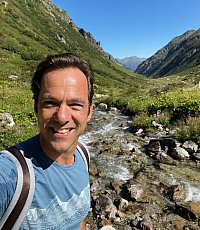Michael Marchetti, Feb 17, 2024 in Gandhi 3.0, 2024
[Below are a few of my reflections on our unforgettable time together -- which I originally wrote in German, but ChatGPT has dutifully helped me translate it.]
It's a feeling that's addictive. A pull that captures us. An energy focused on giving - and that at every opportunity and without expecting anything in return. What is going on here? None of the participants at the Gandhi 3.0 retreat know exactly what awaits them - we are all curious. Forty participants from all over the world and an equal number of volunteers have traveled to Ahmedabad in India. The retreat cannot be booked for money. There are waiting lists. Those who receive an invitation usually accept quickly. In my case, as a volunteer. Five days and four nights in the spirit of service and love. Those who wish can immerse themselves in Indian culture and Gandhi's life for a few days beforehand.
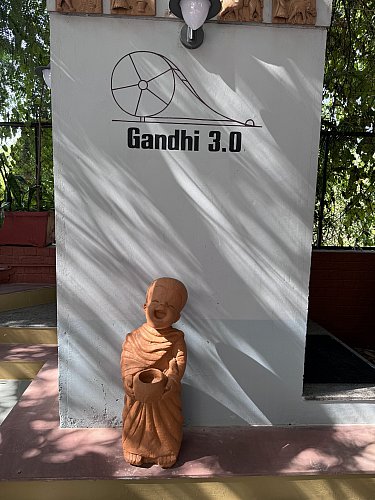 It's a retreat that precedes its reputation for turning lives upside down. Perhaps it flips a switch. The switch for a new perspective on the world. Exaggerated? Not when you look closer. The first glance with different eyes at the same surroundings remains unforgettable. That may be one of the reasons for the return of previous participants in a new role. "To lean into love and get out of the way," says Bijan from Germany about his motivation. Wakanyi from Kenya speaks of an "upgrade": "I was a guest last year, now I am even a higher guest: I volunteer!" she laughs.
It's a retreat that precedes its reputation for turning lives upside down. Perhaps it flips a switch. The switch for a new perspective on the world. Exaggerated? Not when you look closer. The first glance with different eyes at the same surroundings remains unforgettable. That may be one of the reasons for the return of previous participants in a new role. "To lean into love and get out of the way," says Bijan from Germany about his motivation. Wakanyi from Kenya speaks of an "upgrade": "I was a guest last year, now I am even a higher guest: I volunteer!" she laughs.
Kotaro from Japan has also switched sides and this time joins 37 others in the service of the cause. His goal: "To surrender." At the beginning of the retreat, when participants from all over the world arrive in India around the clock, he will run the so-called "Jet Lag" Café. Being there for them and staying up with them when they can't sleep, get hungry, or seek a conversation. Later, he will hold the microphone when others speak up in the big circle, and he will do it with a humility that pains his knees because of squatting for hours. The young man comes from a family that manages a major financial fund. Here he strives to be invisible.
No staff, no impact, no seeking!
Other volunteers are tasked with airport rides, setting their alarms in the middle of the night to be on time. A film crew is constantly at work, trying to capture important moments and editing the footage on a laptop while others take breaks. Who gives and who receives? Sometimes the matter seems clear, but the more we delve into it, the more these boundaries blur. Nipun, our host, reveals in the pre-meeting that it takes 11,000 volunteer hours to prepare for this retreat. It is the largest one ServiceSpace hosts every year, now for the sixth time. "Actually, it's more, but we stopped counting at 11,000 hours," he laughs. Not a single one of these hours is paid, and Nipun is proud of that. Intrinsic motivation is the strongest of all, absolutely incorruptible. The principle is therefore: No Staff, no Impact, no Seeking. And his personal goal? To not stand out! As the mastermind of the event, it's not an easy balancing act. He succeeds by letting others take the lead. In the room where the group meets every day in a large circle to discuss, meditate, and be silent together, he prefers to sit on a wooden chair at the back wall. He asks others to moderate. And yet he knows exactly when it's time to express a thought or initiate a discussion. The modesty and humility behind this attitude were succinctly expressed by Gandhi himself in a quote: "The seeker after truth should be humbler than the dust. The world crushes the dust under its feet, but the seeker after truth should be so humble himself that even the dust could crush him. Only then, and not till then, will he have a glimpse of truth." But that's only half the truth. Nipun's second goal is: "Being in joy." Joy - that's his secret, which he gladly shares - comes automatically when serving others.
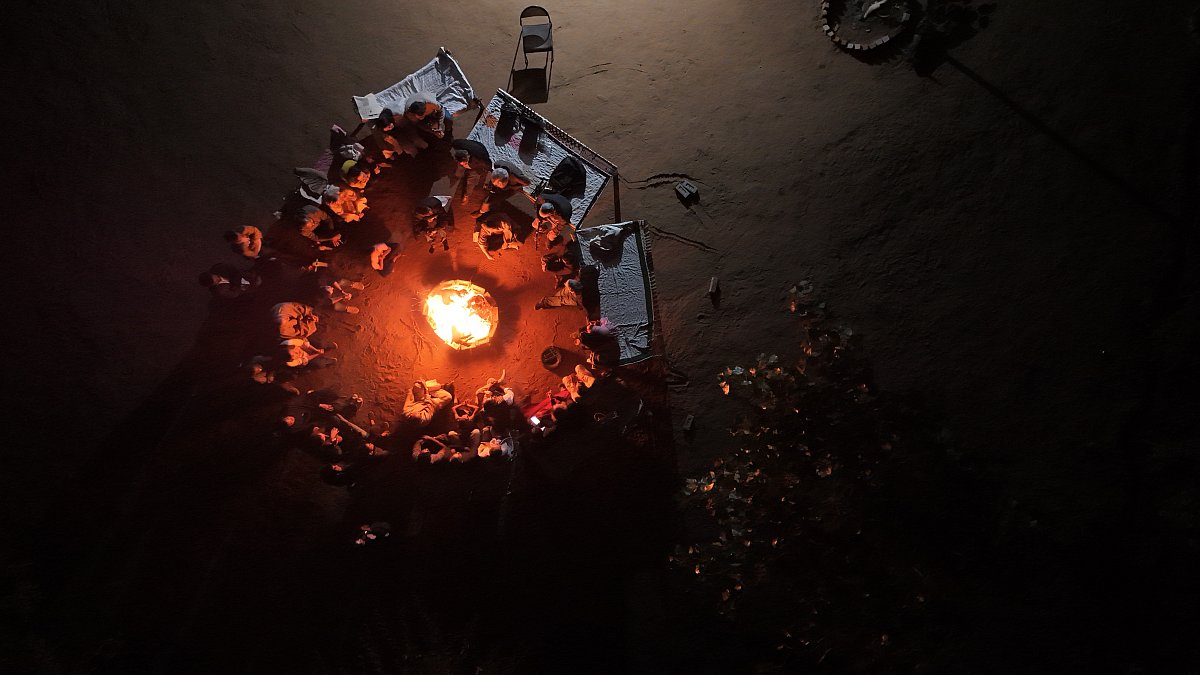
This year, the official opening is on January 17th in the afternoon. The location: a retreat center and garden paradise on the outskirts of the Indian metropolis, where Gandhi lived in his ashram on the banks of the Sabarmati River for 15 years. "Welcome Home!" we volunteers greet each guest at the entrance gate and serenade the arrivals. Every detail on-site is designed to make the guests' stay as pleasant as possible: flower petals on the ground, inspiring quotes on the brick walls ("Your daily life is your temple"), bird chirping, a pond with fish and turtles offering tranquility for meditation. Also, what is not visible works: the dedication with which the food is cooked in the kitchen. The silent prayers with which the kitchen team blesses the meals for the participants every day. All of this is part of the nourishment that not only satisfies the body.
Let me do this for you! While washing dishes at the back of the dining hall, dozens of hands with sponges and towels scurry over the round silver trays and small metal bowls. "Blessed are they who clean up" is engraved on a stone tablet above the faucets. Annoying work? Here it seems more about who can grab an extra plate from a participant. "Let me do this for you!" is one of the most spoken phrases in this place. Professors from elite universities in the USA are here washing dishes alongside Grammy winners, lawyers, entrepreneurs, former White House employees, a Tai Chi master. Conversations quickly shift from small talk to heart level. The dynamics of the group, where friendly people effortlessly engage in deep exchanges with each other, open a door within us.
You can watch it happen, a kind of sinking into a state of trust, where PowerPoint and pitch take a break. The faces of the newcomers relax. It's no longer about whether you can grab a coffee in time before the morning program starts, but about recognizing when the cups are running low and which ones to fetch so that no one is left empty-handed. "We are covering each other's back," says Meghna, who is responsible for organizing the volunteers on-site.
A large circle in the afternoon sun marks the start of the actual retreat; we gather in the garden, hold hands, and listen to Pom's song. He lives in California, at the foot of Mount Shasta, sacred to his people, and opens the event with this lengthy prayer. Just as important as speaking at Gandhi 3.0 is silence. Anchoring in silence, short meditations thread through our days here. Even the second day, with the theme of personal transformation, we start in silence in the big circle.
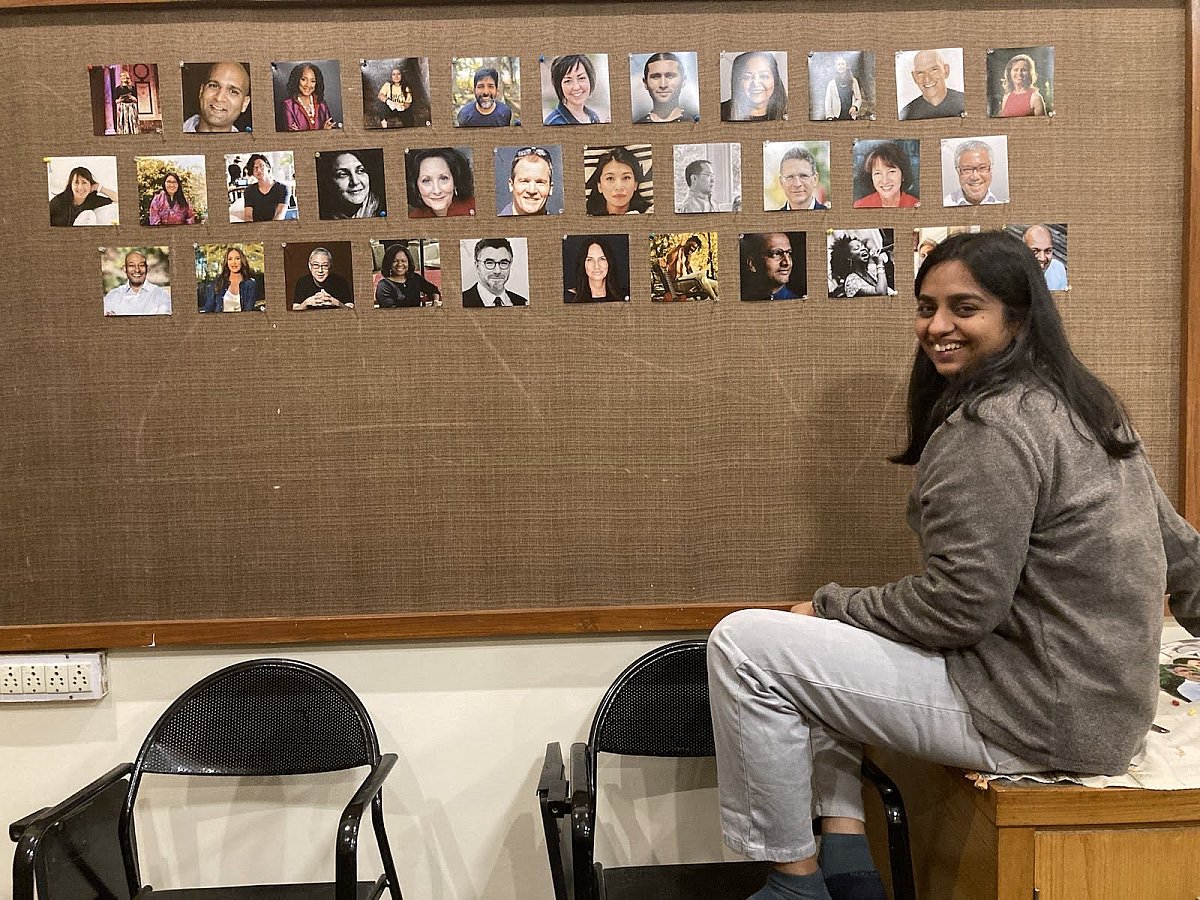
Listening to the inner voice
We learn details about Gandhi's life. From an initially unsuccessful lawyer who liked to dress finely and take dance lessons, he became a moral authority for millions of Indians. This did not happen by chance. Gandhi trusted his inner voice, but he also knew that it was important to listen well first. "Our ability to hear this voice correctly and clearly is directly proportional to our inner purification," he warned. He devoted 15 years to nothing but this "inner work." He lived with about a hundred companions on the banks of the Sabarmati River, he wrote eleven rules for his ashram, truth, nonviolence, poverty, and abstinence were at the forefront. But tolerance for all religions or physical work was also important to him. He was not swayed by the storms of world politics, by external pressures. He waited for the right time. For 15 years. Then the time was ripe, and things almost happened by themselves: Gandhi set off on the Salt March, never to return to the ashram, and made history. But before that, he sat at the spinning wheel for hours, days, years. His consciousness had become as delicate and fine as the cotton that transformed into threads in his hands while spinning.
A wonderful anecdote tells of how Gandhi, shortly after his return from South Africa as a lawyer, wanted to represent the Untouchables of Indian society. They resisted, found it presumptuous. A protest march visited him in the ashram, they demonstrated, were outraged. As the day waned, Gandhi asked the leaders where they wanted to stay overnight? They had no plan. So he invited them. "Let me take care of you. You will be my guests tonight. Stay here, sleep in our ashram. Tomorrow you can still continue your protest." What a powerful gesture of humanity! He embraced the reservations of his opponents with them until they dissolved.
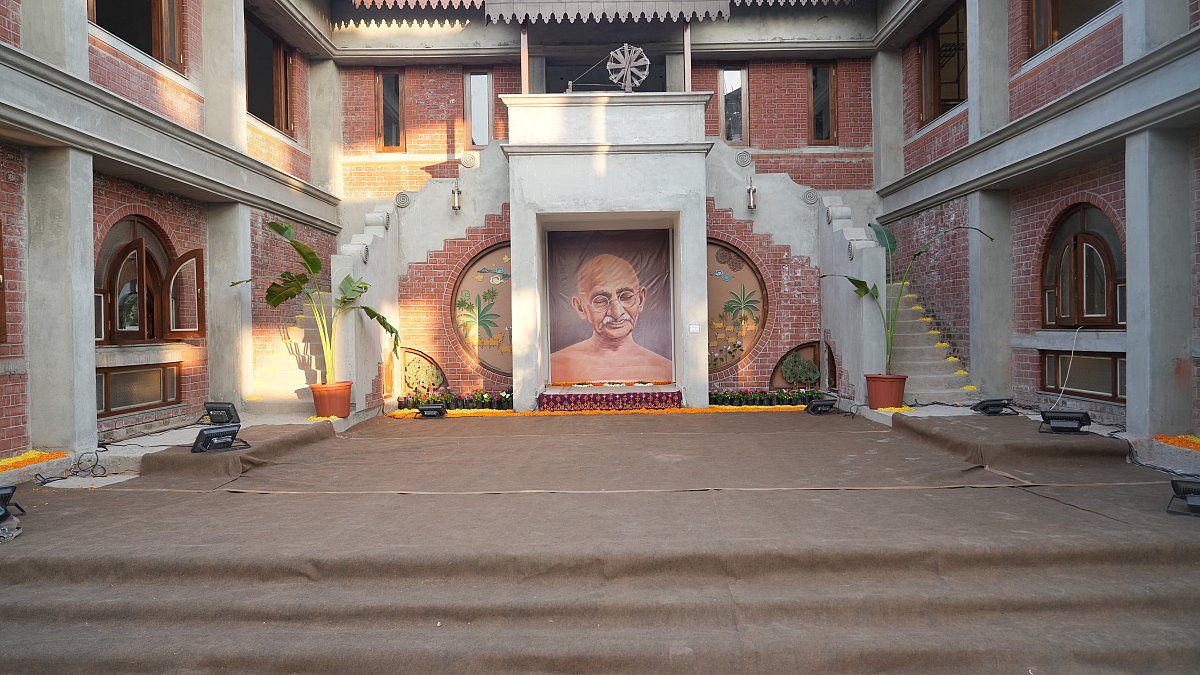
Acupuncture Points of Love
But what does it look like for us, over 70 years later, in a daily life full of time pressure and competition? In a world where the eight richest billionaires own as much as half of humanity on this planet? Where are the "acupuncture points" through which we can act lovingly?
The biographies of the participants and their inspiring stories make it clear that practically everyone in the circle has already asked themselves this question. There's Nimo, the singer, who studied economics at an elite university in the USA and made a career on Wall Street before deciding to work as a musician with street children. Sarah, the Tai Chi master, who lived for years with homeless people in the slums of Nairobi and whose entire belongings fit into a small backpack. Preeta, a successful lawyer who served in the White House under President Obama and now says she has found her way "From the white house to the right house." Kensuke, a successful Japanese designer who lost his company, his relationship, his house, and his fortune within a few weeks at the end of the previous year and tearfully thanks for the support he feels here. He doesn't know how to proceed now. Not knowing. "That's not a bad starting point for a truly vibrant life," says Nico from South Africa. Sometimes dramatic events catapult us out of our comfort zone, such as a near-death experience. Or a gentler deviation from the conventional path, accepting less salary, uncertainty, sometimes ridicule, holding onto the path of the heart.
Just the right questions can open doors, and here we learn to ask them: What is success? What can you do less in your life to serve more? How can I detach my work from an expected outcome? What grows in the space between us, once we are related?
A Highlight: The Silent Dinner
In the evening, a silent dinner awaits the group, it is one of the highlights of these days: in the twilight, the participants approach the dining hall barefoot and in a single file, music softly plays from the terrace, two volunteers wash the participants' hands, drying them carefully. Jayesh, who built the retreat center with his father, welcomes everyone this evening with a silent embrace, we are completely with ourselves, the movements almost reverent, full of dignity, without haste. Hundreds of candles illuminate the path on the ground, while the first stars are visible in the evening sky. All of us, participants and volunteers - the boundaries blur - can show ourselves as we are and let our hearts shine. And how they shine! They are wide open, fearless, full of trust. Prayers and blessings accompany each participant during the communion. Gratitude, beauty, humility, reverence, mindfulness, and devotion - all merge here and transform into deep joy and vulnerability. It expresses itself in tears running down some of our cheeks.
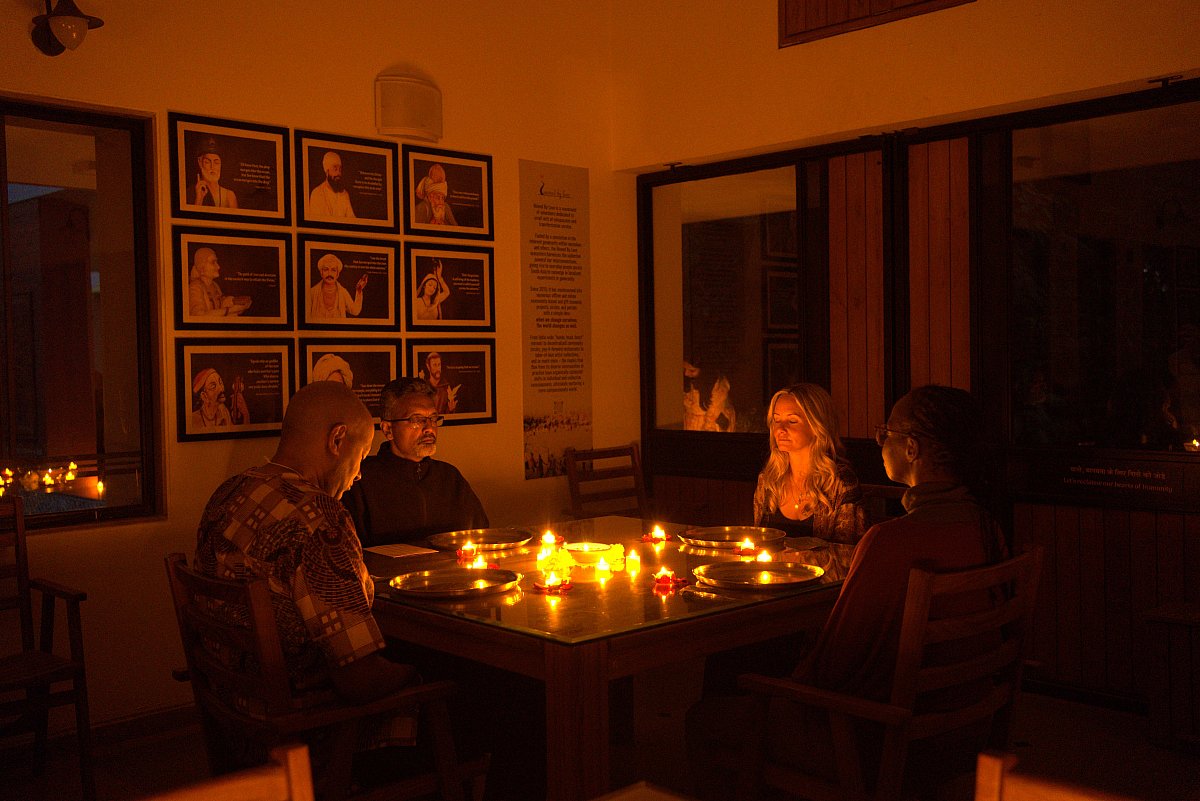
Grace. That seems to be the appropriate expression for what we are allowed to experience here. "It felt like heaven on earth," Scott from the USA will later say about it. Nods in the circle. Day three. We have arrived at the "We." Sounds good, but has a catch. The danger with "We" is that this term automatically excludes a group - the others. It happens constantly and almost everywhere, sometimes unintentionally, sometimes deliberately: in politics, in business. Here populists maximize votes, there profits are made at the expense of "the others". Capitalism is geared towards maximizing profit. That's why small acts of kindness are so revolutionary, Nipun thinks, because they flip this thinking around.
Noble friends
"We need to redefine success!" demands Jay from Philadelphia. Material prosperity, which he achieved as a successful entrepreneur, eventually wasn't enough for him. In the circle, he tells the story of how he initiated a movement with over 8000 companies, the so-called B Corp. They are purpose-driven. The participating companies do not want to compete with each other because "Winning at the cost of others losing causes pain." We all agree on that here. Me, We, the Others.
It's worth taking a deeper look at this distinction because the longer you contemplate it, the clearer it becomes: these boundaries are an illusion. Juanita, a passionate pastor with African-American roots from Texas, tells how she helped distribute food to the homeless years ago. "At the beginning of the journey, you believe service is something you do for others. Eventually, you realize you see yourself in others." Oh, she thought - that one there could be my brother! Oh, and that one could be my mother! Oh, and this person - that could be me! "Then it becomes clear: you're actually doing it for yourself."
It's stories like these that inspire; in this extraordinary circle, they seem entirely normal: Chaz, the Reverend from Philadelphia, who asked his family for permission to live with the homeless to develop more compassion. Stacey, the successful businesswoman and congressional candidate who, during a meeting with an Indian yoga master, suddenly realized what really matters and now leads yoga and meditation groups herself. Lulu, who lives as a social entrepreneur in Spain and together with her husband accommodates 900 guests in her home in a year. Xue, who gave up a successful career at Goldman Sachs and now helps direct investors' money into the "right" projects and manages a piece of land with her family. The list could go on. What a privilege to accompany such people as noble friends!
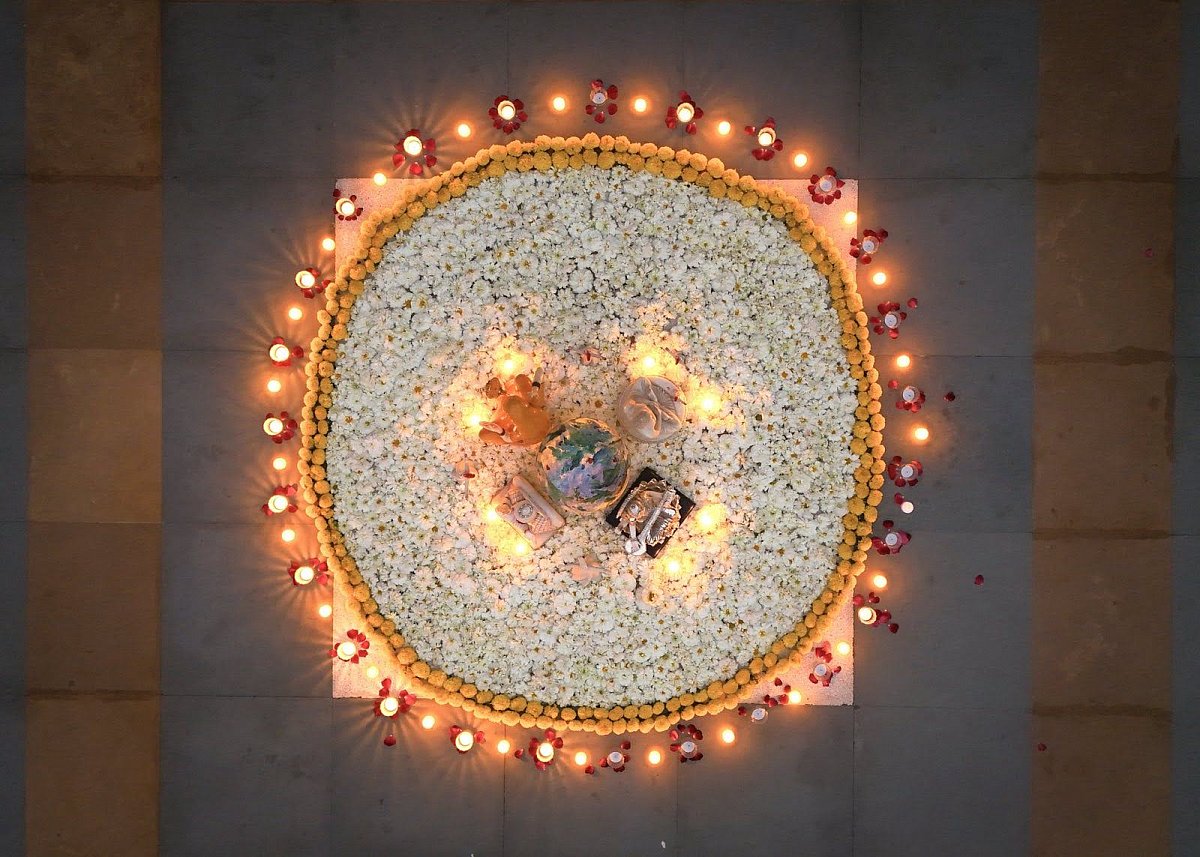
Connecting with the Divine
In the evening, the first big Community Night takes place at the Gandhi Ashram, attended by people from all over India, and a few Europeans have found their way here too, Katharina from South Tyrol with her twelve-year-old son Anton, Moritz from Vienna, Klaus and his wife Margit from Germany. A grand reception, hundreds of school children greet us enthusiastically with chants, there are discussion rounds, an open-air buffet, and afterwards a program with speakers and music, which is streamed live on the internet so viewers from all over the world can join in.
Paul from our circle appears. He is American and plays the sitar, a kind of oversized, Indian guitar, which he has mastered. "It took me 15 years to play in tune," he says. An album he contributed to was awarded the Grammy. How happy he looks, even though it's still difficult for him to make a living from music. It seems as if someone else is playing the right notes with his hands; he lets himself be guided by an invisible force. Ecstasy, rapture. That's it! Reaching for the right string at the right moment. Like the flock of starlings. Movement guided by intuition. A bird only sees its seven neighbors, never the entire flock, and yet they all move in perfect harmony. Why?
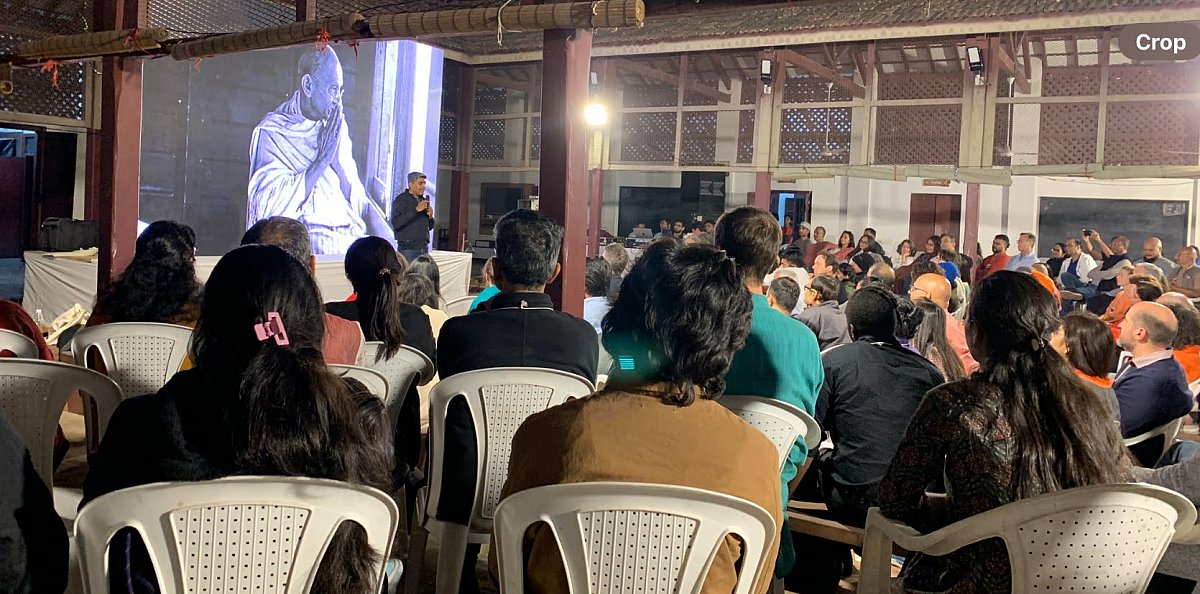
Last day of the retreat.
The inexplicable comes into play, Gandhi called it "The law of love." We watch a movie clip. Will Smith, as Baggar Vance on the golf course, explains the perfect swing to his protege, Matt Damon. "There is a perfect shot out there, trying to find each and every one of us. All we have to do is get ourselves out of its way and let it choose us… Look with soft eyes. See the place where the tides and the seasons and the turning of the earth all come together. Where everything that is becomes one. You have to seek that place with your soul. Don't think about it, feel it!" Swing. Bull's-eye. That's what it's about.
The unity with the swing, not the hit. About our effort, not the goal. About the How, not the What. About the moment, not our plan. About humility. About our song, which only we can sing in this way. We should strive to sing it as well as possible, no matter how many listeners we have.
At noon on January 21st, the retreat concludes with a very special exercise: It's called Three steps, one bow. Following the example of Reverend Heng Sure, who in the 1970s, as a monk, together with Heng Chao, his companion, pilgrimaged through California in this way for more than two and a half years. We try it for a good hour, before Nipun jokingly instructs us not to fall into Samadhi, but to keep the distance to the person in front of us evenly, so that there is no congestion during the circumambulation of the retreat center.
We start at the Peace Pole, then around the pond with the turtles and fish, past the meditation hut and the old trees that shade us. First, we go down on our knees, then the head approaches the ground, we bow between ants and leaves, beetles and bird droppings. It's a gesture that expresses gratitude and reverence; at the end of the movement, our heart is higher than our head and hands. Time to silently express gratitude. To the wonderful people with whom we were allowed to experience this journey. To those who invited us to do so. And to those at home who have our backs and make this experience possible. In the end, our feet are washed, and we sit quietly, one last time, in meditation close to each other.
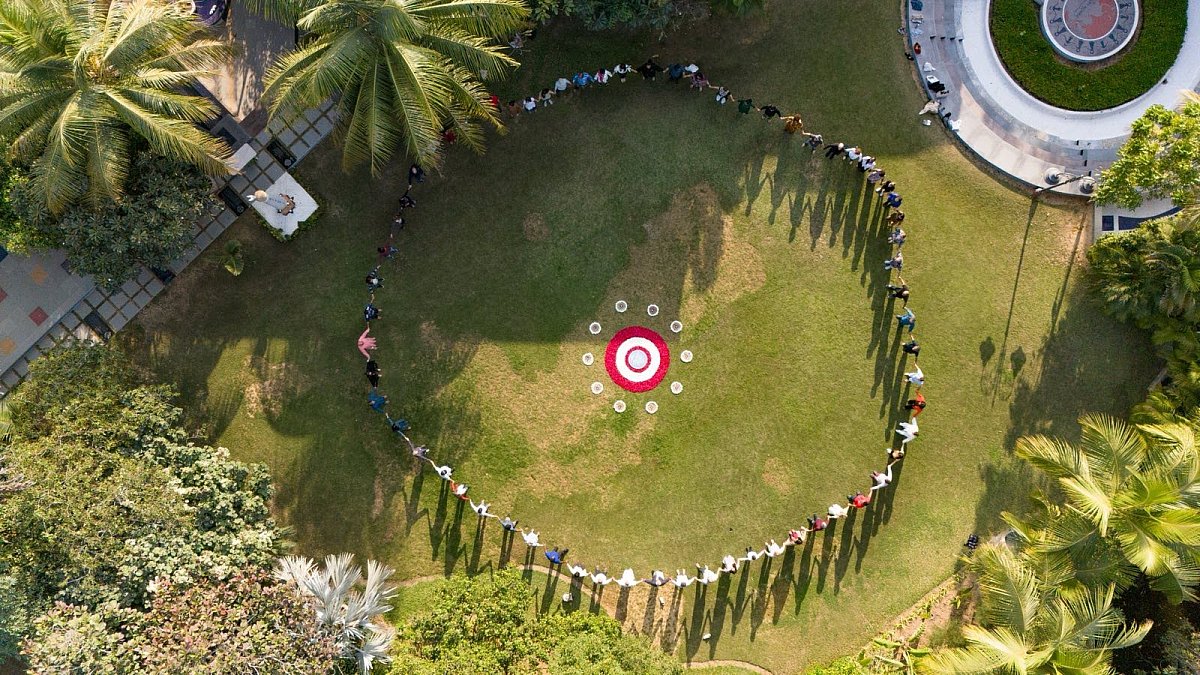
Nipun likes to joke that actually, no one knows exactly what happens here. People who don't know each other come together without a plan for a few days, without knowing exactly what they are doing. Then they go home with the impression of having experienced something special. But when they try to tell their curious loved ones what it was, they realize: it's hard to put into words. Like trying to describe smelling the fragrance of a beautiful rose, and feeling like no words can ever truly match the experience.
